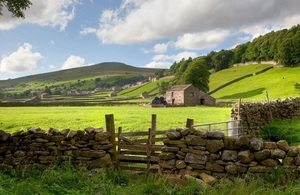 The National Trust’s new report, ‘A Climate for Change: Adaptation and the National Trust’, says climate change is its ‘biggest threat’, and sets out the actions it will be taking in the next stage of its plan to tackle the climate and nature crises.
The National Trust’s new report, ‘A Climate for Change: Adaptation and the National Trust’, says climate change is its ‘biggest threat’, and sets out the actions it will be taking in the next stage of its plan to tackle the climate and nature crises.
image for illustration: Open Government Licence v3.0
…. If urgent and large-scale action isn’t taken … more than 70 per cent of the places in our care will be at medium or high risk…
The National Trust writes:
Climate change is the biggest threat to the coastline, countryside and historic buildings we care for. Our new report reveals how we’re tackling its causes and effects and identifying future hazards. From protecting and planting trees to working with coastal communities, helping people, heritage and nature adapt to a changing climate is at the heart of everything we do.
If urgent and large-scale action isn’t taken to address climate change, we predict that more than 70 per cent of the places in our care will be at medium or high risk of climate-related hazards by 2060. We gained a better understanding of risks such as flooding and coastal erosion in 2021 with the launch of our Climate Change Hazard Map – a tool that continues to play a key role in how we plan our work to help places adapt to a changing climate. The new layers we’ve added to the map also allow regional teams to flag localised threats posed by climate change.
Building climate resilience
Our new report, A Climate for Change: Adaptation and the National Trust, sets out the actions we’ll be taking in the next stage of our journey to tackle the climate and nature crises. It builds on over two decades of work to ensure coastline, countryside, rivers and historic buildings are ready for and resilient to the current and future consequences of climate change. We’ll also use lessons from the last century of caring for these places of nature, beauty and history to help us navigate the next.
We don’t have all the answers yet, but we know that by testing new adaptation approaches, and learning from past experience, we can improve our response to some of the biggest challenges we’ve ever faced.
Current and future challenges
In the short term, we face challenges caused by flooding, wildfires, drought and coastal erosion. In the long term, we must prepare for extreme weather, which will threaten wildlife habitats, and increase humidity, which will make it more difficult to care for priceless artworks and collections.
We’ll also have to adapt to changes in visiting patterns. Hotter weather, for example, could mean that more visitors choose coastal places over inland historic estates at the peak of summer….
Our approach
The challenges we face from climate change are as diverse as the landscapes and historic buildings we look after. Our teams across England, Wales and Northern Ireland are starting to tailor climate adaptation and mitigation measures to meet the urgent and specific needs of fragile stretches of coastline, complex heritage sites and nature habitats.
What is climate change adaptation?
Climate change adaptation is about changing the way we manage the places in our care to reduce the risks posed by climate change.
Planting crops and flowers that can survive high temperatures and drought is one example of climate change adaptation.
What is climate change mitigation?
Climate change mitigation?refers to actions aimed at reducing the harmful impacts that human activity has on the global climate. These can include measures to reduce or absorb greenhouse gas emissions.
Some actions support both climate change adaptation and mitigation such as planting trees, which can help prevent flooding and store carbon.
Calling for progress
We’re calling on the Government to introduce new legislation that recognises the importance of adapting buildings, coastlines and countryside to cope with the impacts of climate change. We want to see a Climate Resilience Act, with clear legal duties and targets for adaptation, and a new dedicated minister. This proposed legislation will ensure adaptation is on an equal footing with climate change mitigation and the pathway to net zero.
For more background see BBC News

